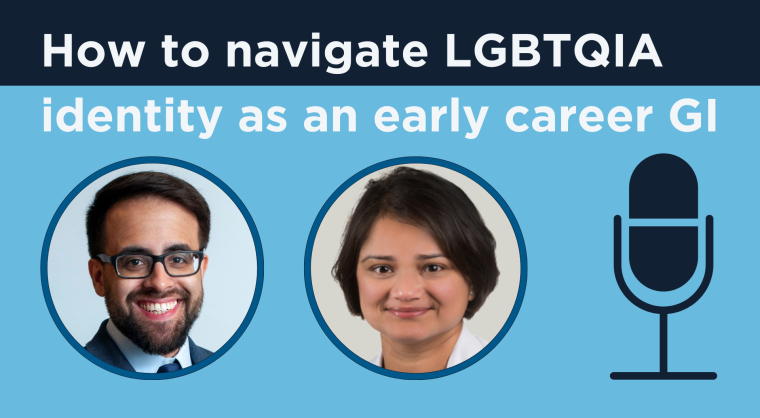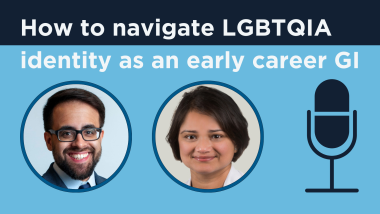Small Talk, Big Topics hosts Drs. Matthew Whitson and Nina Nandy interview guests Drs. Christopher Velez and Sonali Paul for a special Pride Month episode. Dr. Velez is a neurogastroenterologist at Massachusetts General in Boston, Massachusetts and Dr. Paul is a transplant hepatologist at the University of Chicago. They discuss creating a community for the LGBTQIA community in GI, address how to best care for LGBTQIA patients, plus, advice and trauma informed care.
To kick off the episode, Drs. Velez and Paul discuss how their careers and life intersect with the LGBT community by sharing their coming out stories. Dr. Velez says he came out relatively late in medical school and was trying to reconcile with that part of his identity. He struggled with who he came out to and was worried about being mistreated because of it. He ultimately created a foundation of comfort in himself and then built advocacy for himself in his communities.
Dr. Sonali shared about her strict South Asian background, and how “being gay was not part of the algorithm.” In college she came out to a few people, but was also hesitant to who she came out to and when. When she came out to her parents, they disowned her and did not attend her wedding. This taught her so much about how personal it is and how difficult coming out can be. Her relationship with her parents has since improved, largely since she would like for them to have a relationship with her son.
When offering advice for future generations, Dr. Velez says there is no one way to come out and not one way is correct. There are issues that exist in every city and every state. He grew up in New York and thankfully, had a person in power who had experience in working with an LGBT community. Dr. Paul agreed, saying individuals should come out when they are comfortable. She was concerned about health disparities in this community in GI, but was dismissed, which caused her to recoil. She states that one person can have a tremendous impact on you – for good or bad.
The guests also discuss the Rainbows in GI affinity group and its importance, which originated on Twitter. The group’s mission is CHARM: community, healing, advocacy, research and mentorship. This visibility is valuable, and helps people realize that there are others who have the same interests as you, Dr. Paul says.
They also discuss how program or fellowship directors can make the LGBTQIA community feel welcomed in GI, beginning with statements prohibiting discrimination. The hosts and guests point to how training numbers nationwide have dropped in states with reproductive rights and people have become increasingly hostile towards LGBTQ friends.
To foster an inclusive training program, Dr. Velez suggests to not make assumptions and to create an affirming recruitment environment. Dr. Paul says some applications have pronoun fields which make people feel more welcome, but also suggests having pride flags in the office to assure this community that they are safe.
The disparities in healthcare for the LGBT+ population are astronomical. Broadly, this community suffers with more mental health including depression, anxiety and minority stress. LGBT+ people are two to three times more likely to suffer from substance abuse than heterosexual people. There is also an increased amount of violence suffered in this population, along with increased rates of obesity and heart disease. There is still a lot of implicit bias associated with this community in healthcare. In academic medicine, there is very little given about LGBT+ issues and the research being done still uses offensive terms, which at times includes misgendering someone, where the assumption is worse than the misgender. This all weighs down on this community and they find ways to cope, and sometimes not in the healthiest way.
There are blind spots for the LGBT community in healthcare because there are so many unknowns since this data hasn’t been collected. Dr. Paul shares the importance of getting to know patients and their sexual orientation. She doesn’t want to miss this huge part of who they are or be standoffish that they don’t feel like they can talk to her. She says she does patients a disservice for either of these outcomes. The language you use matters especially with pronouns, but it doesn’t exist if you choose to not try to assess that. It is easy to dehumanize and do it well for some people, but not for others, and then we say it’s important for that group.
In addition, they discuss trauma informed care in GI and say that rates are higher in this community, but we should ask all patients these questions. There are ways to mitigate the uncomfortable experiences and many LGBT+ people avoid the doctor because they don’t know what will happen in the exam. Even though the topic is sensitive, we should ask about trauma. Even if it takes a few times, you planted the seed that you’re a safe person and you care. Asking about trauma requires practice like everything else and you need to have a sense of cultural humility. You can also shift the power to them and patients can sense that you are comfortable discussing their trauma with them.
Lastly, they talk about what is meaningful to them for Pride Month and any traditions they have. Dr. Velez talks about the history of pride and how it’s a march, not a parade. He states that they are still marching for progress and equality. He likes to celebrate pride by reconnecting with friends. Dr. Paul says she used to struggle with Pride Month because she was surrounded by all these people who were proud of who they were, while she kept thinking something was wrong with her. She now celebrates pride at her son’s school by doing an activity with the class. She also celebrates her wife’s birthday during pride by decorating the kitchen with rainbow colors and making breakfast before the march. Dr. Nandy likes to reconnect with friends and volunteer for first aid with the march while Dr. Whitson is hosting a pride brunch for the first time, and shares that his family is starting their surrogacy journey.
Connect with this episode's guests:
Follow Dr. Christopher Velez on Twitter.
Follow Dr. Sonali Paul on Twitter.













